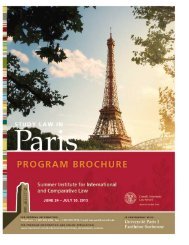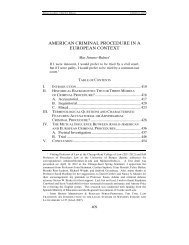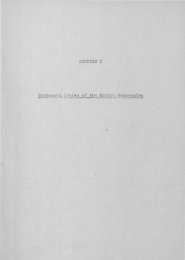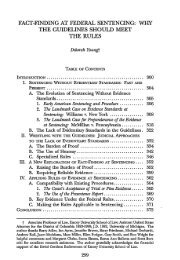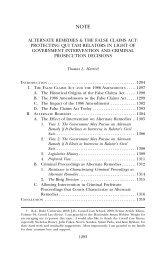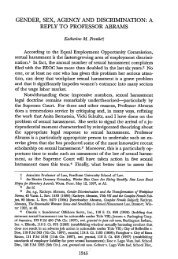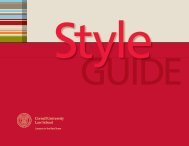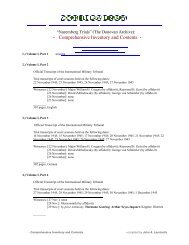JUDICIAL CLERKSHIP HANDBOOK - Cornell University Law School
JUDICIAL CLERKSHIP HANDBOOK - Cornell University Law School
JUDICIAL CLERKSHIP HANDBOOK - Cornell University Law School
Create successful ePaper yourself
Turn your PDF publications into a flip-book with our unique Google optimized e-Paper software.
COVER LETTER<br />
The same concerns about both appearance and content which apply to resumes also apply<br />
to your cover letters. Your cover letter should be considered a writing sample. Even a<br />
strong resume and references may not be enough to overcome poor grammar, bad<br />
sentence structure, typographical errors or misspellings in your cover letter. Edit and<br />
proofread carefully.<br />
It is difficult to give generic advice about the style of this letter. Many people keep it a short<br />
transmittal letter that simply describes the materials enclosed. See Sample 1, Appendix P.<br />
Other people use the cover letter as another opportunity to emphasize what sets them<br />
apart. It is probably not worth discoursing generally on Awhy I want to clerk.@ On the other<br />
hand, there are several situations in which a substantive cover letter clearly makes sense. If<br />
you had an extended Alife before law school@ ‐ another career, substantial academic training<br />
in another discipline, etc. ‐ you may want to briefly discuss why you came to law and what<br />
your prior life adds to your professional legal skills. (See Samples 2 & 3, Appendix P).<br />
Similarly, if you are applying to a specialized court, like the bankruptcy court, you should<br />
mention any relevant experience (e.g., accounting) as well as any directly relevant courses<br />
you are taking. If you plan to practice in the geographic area, say so. Finally, if you have<br />
special interest in or connections to a geographical area, highlight them. Many judges,<br />
especially in state courts and federal district courts outside major metropolitan areas, look<br />
for people who have lived, or plan to practice, in the area. Again, we urge you to try your<br />
hand at a draft and bring it to your meeting with someone on the Judicial Clerkship<br />
Committee.<br />
Whether simple or substantive, all cover letters should convey the following basic<br />
information:<br />
C year of graduation and year of clerkship applied for;<br />
C a list of what=s in your application packet including, for the writing sample, a<br />
description of what it is, when you wrote it, the extent to which it has been edited<br />
by others, or that is unedited by others, and (if applicable) a statement that you<br />
have permission to use it;<br />
C names of people serving as your references (e.g., AProfessor X, for whom I am<br />
working as a research assistant@; AJudge Y, for whom I interned during my first‐year<br />
summer@) with a description of who they are if there is anything useful to be added<br />
on this subject;<br />
C if the area is geographically distant, a reference to any travel plans you may have, in<br />
order to facilitate scheduling an interview. This is likely to be more effective with<br />
state court judges or geographically‐isolated federal district court judges than with<br />
19 | P age



